Interestingly, Keynes thought markets were more “efficient,” to use the modern word, in an earlier period at the beginning of the twentieth century when managers owned most of the shares in a company and knew what the company was worth. He believed that as shares became more widely dispersed, “the element of real knowledge in the valuation of investments by those who own them or contemplate purchasing them … seriously declined.”
Welcome back. Just a moment while we sign you in to your Goodreads account.


